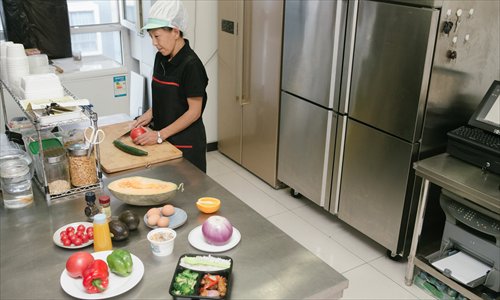
The central kitchen of an online food vendor promoting healthy takeaways in Chaoyang district. (Photo: Li Hao/GT)
Almost every day, an hour before supper time, Frank Yao, a 34-year-old professional who works in Beijing's telecommunication industry, turns to one of his takeout apps. He browses through dozens of options, chooses his favorite foods and waits for the delivery man to arrive.
"Before the advent of meal-ordering apps, I always ordered meals from flyers of restaurants by calling them. But now, I have a much wider range of choices by using the apps," said Yao, who does not like cooking at home.
Like Yao, an increasing number of working people or otaku (people who prefer to stay at home) turn to online takeaway services when they do not have the time, or are too lazy to cook themselves.
The proliferation of online meal ordering platforms such as ele.me and Meituan Waimai have attracted a lot of diners with the frequent special offers, wide range of choices and customer-based review systems.
According to recent research by Analysys.cn, a data research company, despite the fast-developing online food delivery culture, one of the biggest problems is food safety. With the mix of good and bad vendors, it is difficult to check up on and supervise all of them.
A new food safety law was implemented on October 1 to address the safety concerns. It requires online food services to verify vendors operating through their platforms and to check for vendors' licenses.
Since recent media investigations revealed that there are still some unqualified vendors on the platforms, some food safety experts suggest consumers be wise in selecting safe and healthy online takeaways.
Takeaway wise
Having bought takeaways for more than two years, Yao has learned a lot. He said that it is a process of trial and error.
"Sometimes I will encounter a good meal based on my own judgment as well as the ratings and reviews of diners, but sometimes they are not all good," he said.
On some occasions, Yao would find a hair in his meal or feel uncomfortable after eating.
He has also experienced that after ordering from a restaurant for the second or third time, the food does not taste the same as it did the first time.
To reduce the risk of a bad experience when trying a new vendor, Yao will choose a meal from the pictures that looks light and healthy, without too much oil and salt. "Both tasty and healthy food are important, but a healthy option is more important. So I prefer restaurants serving dishes with less salt, oil and meat, and more vegetable variety, such as salads or sushi."
Then he will check the reviews of other diners, the prices, packaging and the attitude of the delivery people to make an overall assessment of the vendor and its food. Price is an important criteria. Too expensive or too cheap is unacceptable.
"If a meal is too cheap, say, under 10 yuan ($1.57), you can gather that it may not be tasty or is unsanitary," Yao added.
"The attitude of the staff, whether it's the courier or the operator, can also be very important as you can tell whether the vendor has been careful with its service. If they treat you well, they will also prepare food very carefully."


















































